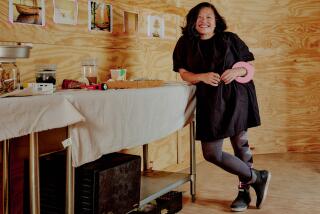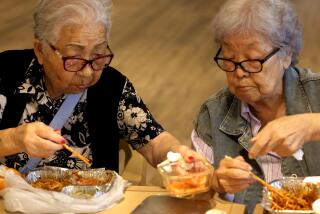Meals That Seem Heaven-Sent
First thereâs the matter of the broken apartment elevator that traps him inside, leaving deliveryman Robert Levy stranded, sweaty but still in confoundedly good spirits.
Along the way, there are locked doors that should be open, streets that his directions suggest are in the wrong place, and people who should be home but arenât.
But when Levy makes contact with a client, that makes his urban gantlet and all its glitches heartily worth it. Three days a week, he abandons his busy schedule as a Hollywood post-production editor to become a food runner, like one of those on-the-fly pizza deliverymen who rush to your door with a hot pie in its protective sleeve.
Levy is one of 1,500 volunteers for Project Angel Food, which ranges across Los Angeles County to deliver noontime meals to homebound men and women with AIDS and other illnesses.
His clients are often too poor or too sick to fend for themselves--lonely people who rely on his short visit, not just for the hot meal but for the all-too-brief moment of company, the fleeting human exchange, because the 39-year-old Levy is many times the only visitor they will have all day.
Levy is a green recruit, on his third week as an agency volunteer. So far, his route has changed with each trip--each tentative face he greets is a new one.
Already, though, he has seen the poignancy of people who waste away alone in tiny apartments and the resiliency of others who seem to be winning their long battle to stay healthy and alive.
There are people like Richard Hughes, an emaciated man who meets Levy at his door with a sad but grateful smile.
âHey, Richard, Iâve got your lunch,â Levy says warmly.
Hughes watches the bustling Levy, hustling through the first of several deliveries, and opens his mouth as if to speak. Instead, he just looks at the sweat stains leaking through his visitorâs T-shirt on the 100-degree day.
âYou stay cool, now,â he sighs, and slips back into the darkness of his apartment.
Levy is part of a stagnant volunteer pool in Project Angel Food at a time when the need for the West Hollywood-based organization is growing. AIDS patients--bolstered by new breakthrough medications--are living longer; in the last three years, the number of Project Angel Food clients has doubled to 900.
Although the group has a vast list of volunteers, only 100 show up most days: 30 to prepare the food; the other 70 have seen their delivery routes grow so large that the agency must pay contract drivers to get all the meals out.
âBack in the 1980s and early â90s, the people who came into our program were dying--virtually all of them passed away within six months or a year,â said John Gile, executive director of Project Angel Food.
âNow some have been with us six years, some who rely on us for meals seven days a week. And there never seems to be enough volunteers to get the job done.â
Struggling Through Early Years
Since its inception in 1989, Project Angel Food has battled not only a fluctuating volunteer corps, but also bitter internal upheaval in its effort to feed its clients.
Founded by charismatic Hollywood spiritual teacher Marianne Williamson, the group quickly became the fund-raising envy of nonprofits for its loyal following of glitzy Hollywood donors, from actress Elizabeth Taylor to producers David Geffen and Barry Diller.
In 1991, the agency reluctantly made headlines when it fired its executive director, Williamson and other board members resigned, and employees made an unsuccessful bid to unionize. Eight employees were laid off, fired or quit in anger--raising questions about Project Angel Foodâs solvency and management.
Gile says those troubled days are gone.
âThere were definitely some personality collisions early on,â he said. âStill, every single day the food went out. The mission never deviated.â
Today the agency enjoys a $3.4-million annual budget and high-tech offices and food preparation area--which on most mornings resemble a busy restaurant kitchen crossed with a bustling taxi company headquarters.
While chefs prepare meals specially tailored to AIDS patients--menus for 20 different special diets--the deliverers mill about, hauling trays and boxes to their cars through a squeaky back door.
Like Robert Levy, the volunteers have other lives. They are out-of-work actors and waiters, students and retirees, mothers who have lost children to AIDS.
On his rounds, Levy sees men and women in all stages of the disease, some who greet him warmly, others who remain mere voices behind a closed door.
âSome people are really ill and others--Iâve thought, âHey, this guy looks healthier than me. Iâm delivering to a bodybuilder.â â
Some veteran Project Angel Food volunteers bring gifts on birthdays and holidays, drive clients to the doctor. Some patients have been found passed out on the floor by their deliverers.
âHow can you not get involved when delivering to people who look so forward to seeing you?â asked Karen Barnes, a 50-year-old Encino resident and former social worker who has volunteered at Project Angel Food since 1990.
Barnes says that she feels inspired when she finishes her route. âI just feel better about the petty things that go on in life.â
But even the most optimistic volunteers must grapple with clients so sick that theyâd rather not see another stranger.
Like the Hollywood man whose body was so racked by lesions that he wanted his food left at the door--with no face-to-face contact.
The arrangement worked fine--until two new volunteers took over his route.
Without looking at the route sheet stipulating the manâs wishes, one woman dashed out of the delivery car with his hot meal and walked right into his apartment.
âBy the time her partner realized, it was too late,â said Freddie Weber, the agencyâs outreach volunteer coordinator. âShe thought, âOh my God, this is awful.â â
Half an hour later, to her surprise, the partner saw her colleague emerge arm in arm with her new client. âShe just walked in the door and put her arms around him, stripping his defenses,â Weber said. âThey became the best of friends.â
An Ever-Evolving Cast of Characters
Most veteran volunteers know itâs dangerous to get too close to clients.
âOne day theyâre just not on the list anymore,â said 70-year-old volunteer Virginia Hall. âIt hurts you deeply. So Iâve found that sometimes itâs best just not to ask what happened.â
Ask Levy why he volunteers and he will tell you it wasnât anything dramatic.
âWeâre all humans, all the same--whether weâre healthy and have good jobs or whether weâre alone, shut off in some little room.â
And so with his professional clients waiting his return from another of his working lunches, Levy cheerfully makes his deliveries. At one home, he peers through a picture window at a small dog that wags its tail.
âIs anybody home, puppy?â he asks.
Then comes his meeting with the broken elevator. His shirt now soaked with sweat, the doors still refusing to budge, he pushes the buttons uselessly. After another moment he turns toward a reporter and holds up the hot lunch of lasagna and vegetables.
âHey,â he says wistfully, âat least weâve got food.â
More to Read
Eat your way across L.A.
Get our weekly Tasting Notes newsletter for reviews, news and more.
You may occasionally receive promotional content from the Los Angeles Times.











